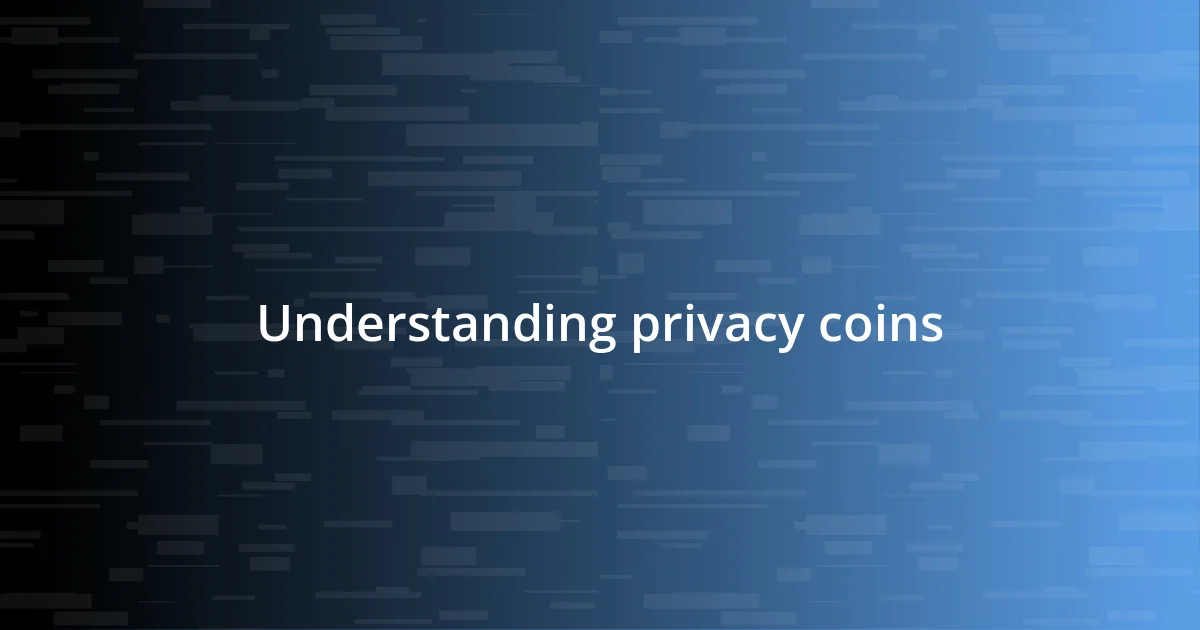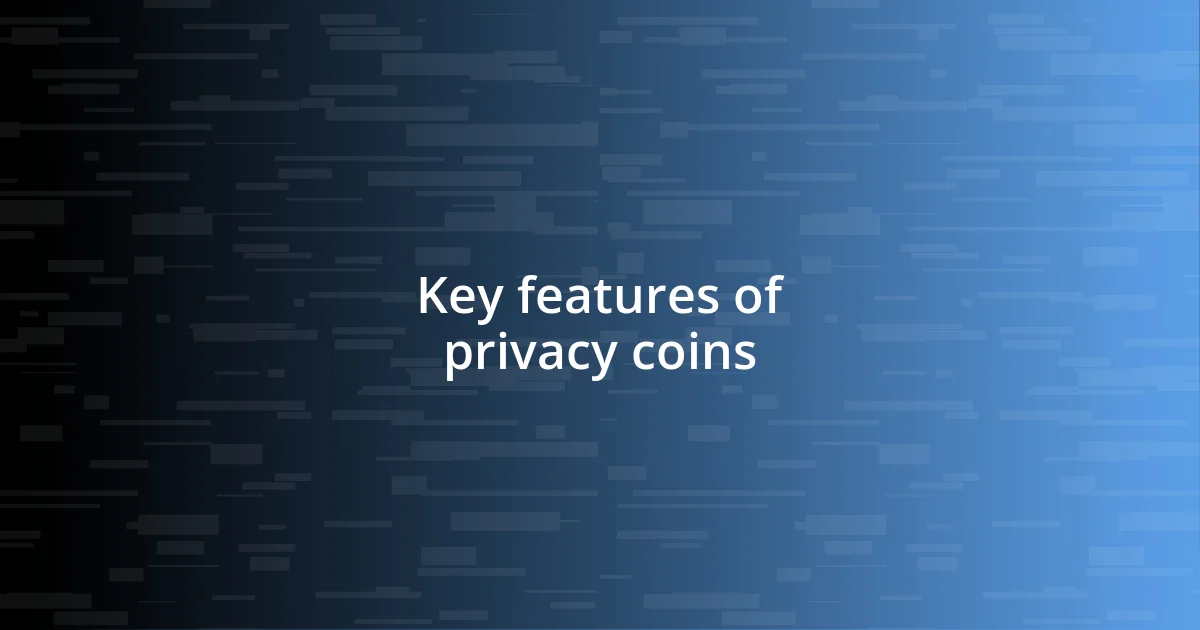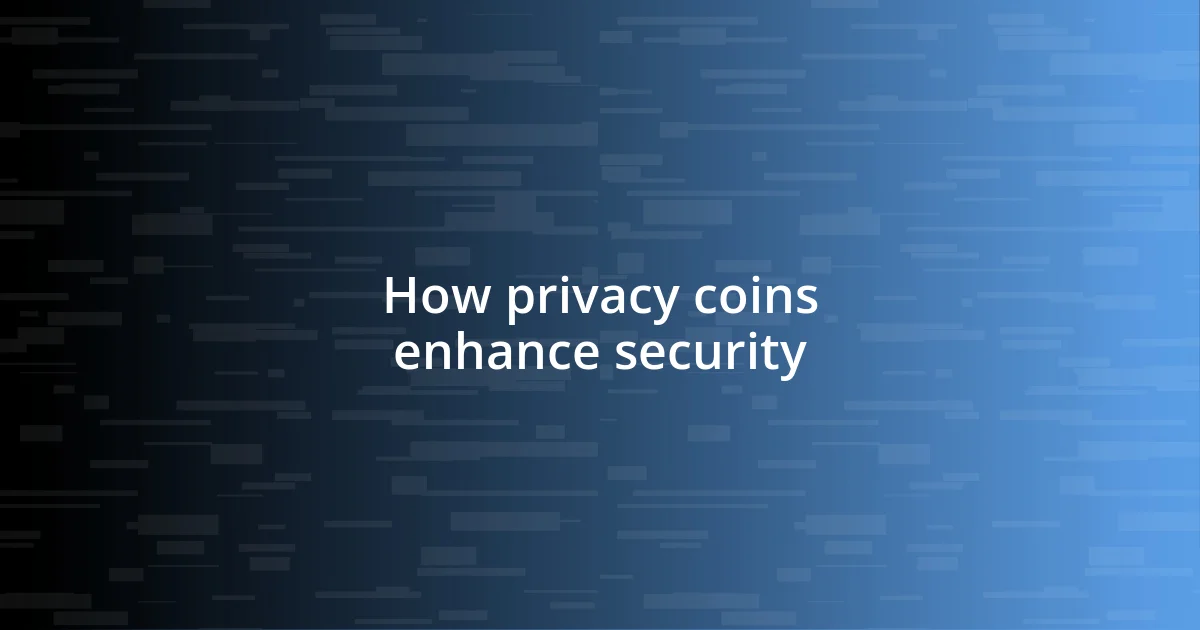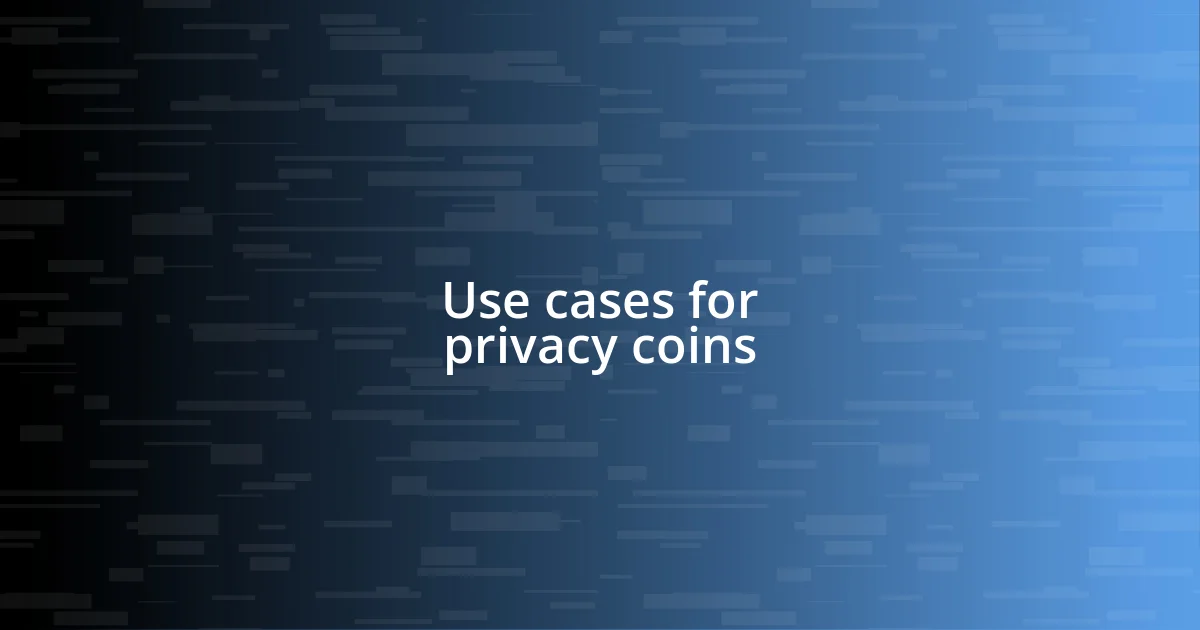Key takeaways:
- Privacy coins enhance transaction anonymity through advanced cryptographic techniques like ring signatures and stealth addresses, raising ethical questions about responsibility and misuse.
- They are particularly valuable in high-risk scenarios, offering secure transaction methods for activists and ensuring privacy in e-commerce, which can boost consumer confidence.
- The future of privacy coins may involve increased regulatory compliance and innovative technologies, potentially transforming how personal financial data is handled in decentralized finance (DeFi) platforms.

Understanding privacy coins
Privacy coins are a fascinating aspect of the cryptocurrency world, designed to provide anonymity in transactions. I remember the first time I learned about Monero; I was immediately intrigued by its unique approach to privacy. The concept of sending money without revealing your identity felt liberating yet also raised questions for me about the implications of such anonymity. Are we heading toward a future where transactions are completely untraceable?
What’s interesting is that privacy coins utilize advanced cryptography to enhance user confidentiality. Techniques like ring signatures and stealth addresses create a maze of obscurity around financial activities. I can’t help but wonder, though, whether this level of privacy promotes positive uses or opens the door to nefarious activities. It reminds me of the old saying: just because you can do something, doesn’t mean you should.
As I dive deeper into this topic, I find myself weighing the balance between privacy and accountability. In a world where data breaches are all too common, the desire for owner-controlled financial freedom is strong. Do we trust ourselves enough to handle such power responsibly? Exploring this paradox is what keeps my interest piqued, as the potential for positive innovation is just as compelling as the ethical dilemmas it presents.

Key features of privacy coins
Privacy coins boast several distinguishing features that set them apart from traditional cryptocurrencies. One fundamental aspect is their commitment to untraceability. This means that transactions are designed to hide the sender, receiver, and amounts involved, creating an environment where users can feel secure. I recall a conversation with a friend who was wary of using Bitcoin due to its public ledger. When I mentioned Monero, he was fascinated by the thought of transacting without leaving a trace.
Another significant feature is the use of advanced cryptographic techniques. For instance, ring signatures mix multiple transactions together, making it challenging to determine which transaction belongs to which user. This complexity is both impressive and puzzling; I often find myself marveling at the ingenuity behind these technologies. It’s like being part of a secret club, where only the members understand the intricacies of their operations. Yet, I can’t help but question, does this exclusivity serve the greater good, or does it lend itself to misuse?
Additionally, privacy coins often employ stealth addresses, which generate single-use addresses for each transaction, enhancing user privacy even further. This feature ensures that even if someone were to see the address, they couldn’t link it back to the original owner. It’s incredible technology, but I sometimes feel a twinge of concern about who might be using it and for what reasons. We need to consider not just what these features offer, but also the broader implications they have for society.
| Feature | Description |
|---|---|
| Untraceability | Transactions conceal the sender, recipient, and amount, ensuring privacy. |
| Ring Signatures | Multiple transactions are mixed, obscuring the true origin of a transaction. |
| Stealth Addresses | Single-use addresses are generated for each transaction to prevent linking back to users. |

How privacy coins enhance security
Privacy coins enhance security in ways that traditional cryptocurrencies often can’t match. The anonymity they provide certainly piques my interest. I remember when I first encountered the term “privacy coin” at a cryptocurrency meetup. It felt almost revolutionary—like discovering a hidden path in a busy city that can lead to a safer neighborhood. This heightened security allows users to transact without the fear of being tracked or targeted, which is especially crucial in today’s digital age, where our information is constantly under threat.
Some key aspects of how privacy coins enhance security include:
- Anonymity: Unlike public blockchains, privacy coins disguise transaction details, making it difficult to trace users.
- Decentralization: By distributing control across a network, privacy coins eliminate single points of failure, thereby enhancing user safety.
- Enhanced Control: Users experience a sense of empowerment as they manage their financial privacy, which can foster a more secure feeling when transacting online.
Ultimately, the veil of privacy coins serves as both armor and sanctuary for users, creating a space where they can operate free from fear. I often think about how comforting it must be for someone in a politically unstable area to have this level of financial discretion. It’s moments like these that make me realize just how impactful privacy coins can be in promoting a secure transaction environment.

Use cases for privacy coins
One of the most compelling use cases for privacy coins is their appeal in high-risk environments, where safety and confidentiality are paramount. I remember a discussion with a friend who works in a humanitarian organization; he mentioned how crucial it is for activists and workers in oppressive regimes to send funds securely. Privacy coins empower these individuals, allowing them to support grassroots movements without fear of detection or retribution. It really made me think about how vital these tools can be for freedom and security.
Another notable application is in e-commerce transactions. Imagine wanting to purchase a product without exposing your financial history or identity—this is where privacy coins shine. I often feel uneasy sharing personal information online, worrying about data breaches or misuse. Utilizing a privacy coin can create a more comfortable purchasing experience, offering users the peace of mind that their transactions remain confidential. Don’t you think that feeling of security can encourage more people to engage in online shopping?
Moreover, privacy coins can serve as a hedge against potential government surveillance. With increasing concerns over data privacy, individuals are searching for ways to reclaim their financial anonymity. Personally, it reassures me to know that there are options available that cater to my desire for discretion in my transactions. It’s like having a well-kept secret in a world where so many aspects of our lives seem exposed. Isn’t it liberating to think that financial confidentiality is still within our reach?

Future trends in privacy coins
The future of privacy coins appears to be punctuated with increasing innovation and regulation. I often wonder how upcoming developments will balance the need for user confidentiality with the demands of regulatory bodies. For instance, there’s ongoing discourse around integrating privacy coins with identity verification protocols, which could offer a hybrid solution that satisfies both parties. It’s fascinating to think about how potential compliance could actually bolster user confidence rather than diminish the core values that privacy coins stand for.
As these coins continue to evolve, we might see enhanced privacy features that leverage cutting-edge technologies, such as zero-knowledge proof protocols. I remember experimenting with such technologies during my studies in computer science; it was mind-blowing to think that one could prove the possession of certain information without revealing the information itself. What if we could apply this concept more broadly in the realm of digital currency? Such advancements could elevate privacy coins’ functionality and attract even more users concerned about data security.
Moreover, it’s essential to recognize the growing interest in privacy-focused decentralized finance (DeFi) platforms. Personally, I find this particularly intriguing because it presents a unique opportunity for users to navigate financial systems without sacrificing their anonymity. Could this be the future of finance itself? As more people prioritize privacy, I believe that privacy coins may not only thrive but transform how we think about transactions in a broader scope. The idea of conducting business in a way that protects personal data feels both empowering and hopeful.














